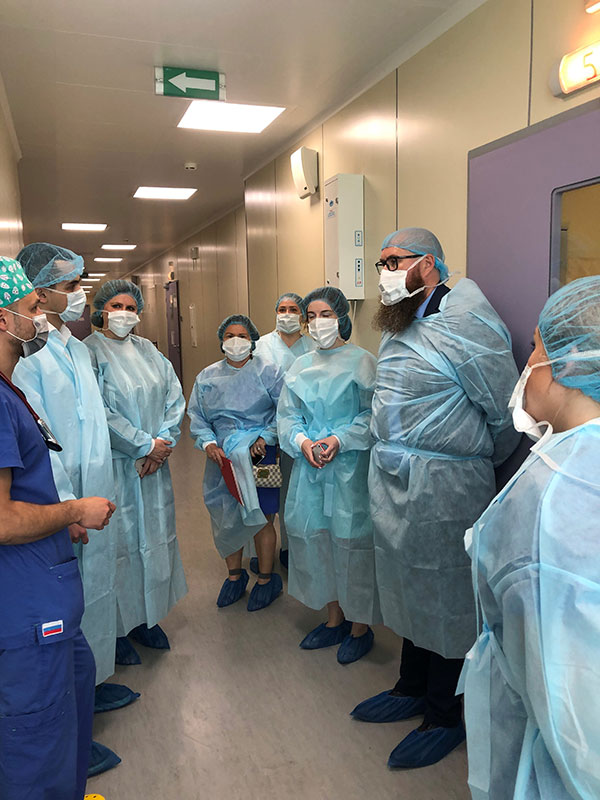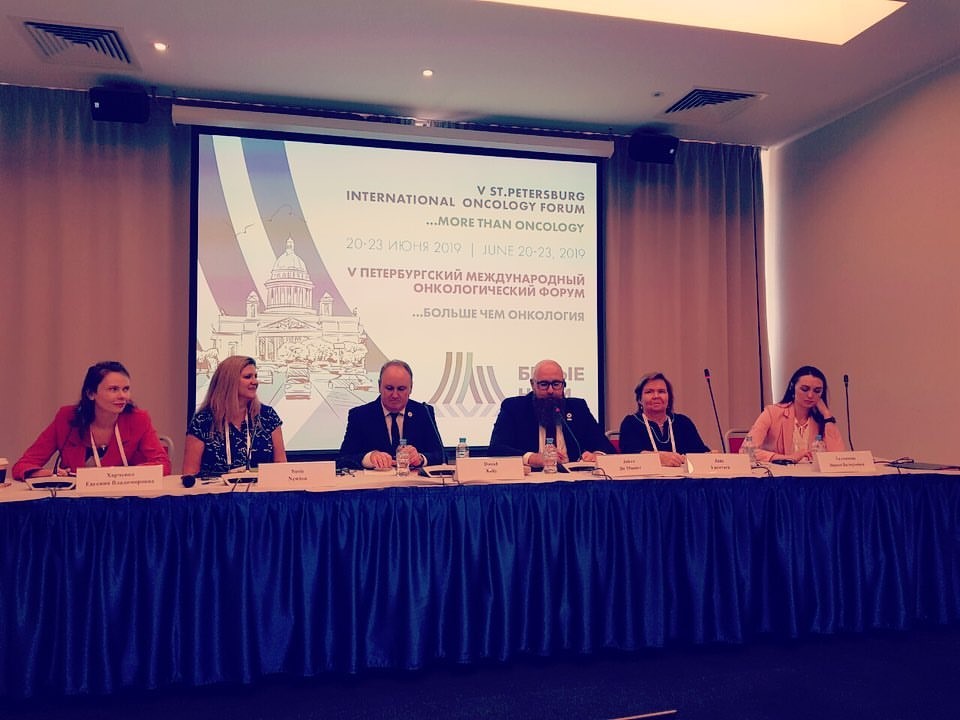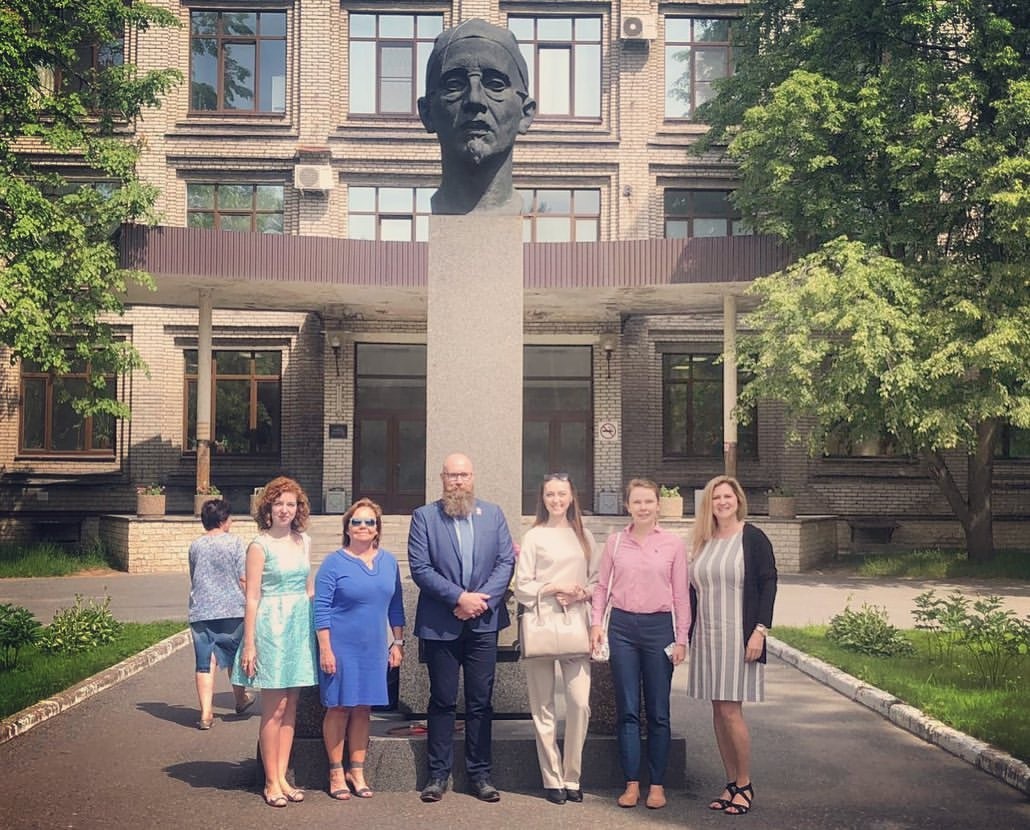By Jane Lacovara, MSN, RN, CMSRN, CNS, Susie Newton, APRN, MS, AOCN®, AOCNS®, Daniel Kelly, FRCN RN, PhD, and Johan De Munter, RN
U.S. and European oncology nurses might feel out of their element in a Russian model of nursing practice, which is considerably different than what they’re used to in their own countries. For example, Russian nurses mix all chemotherapy infusions for patients and have no access to pharmacists. Russian blood and marrow transplant (BMT) units have a much higher ratio of physicians to nurses than what’s traditionally seen in other parts of the west. But, like nurses around the world, Russian nursing professionals are keenly interested in improving their oncology practice—although they typically receive education in an academic rather than technical setting.
But different cultures and practices have much to learn from and teach to each other, so in June 2019, the Russian Ministry of Health sponsored members from ONS and the European Oncology Nursing Society (EONS) to travel to St. Petersburg and deliver presentations at the Fifth Annual White Nights Oncology Forum. The Forum is Russia’s annual cancer conference, historically held for physicians. For 2019, the plan focused on having nurses join the conference—a departure from previous years—to include delegates and faculty from international nursing organizations. With a commitment to sharing and improving nursing practice, we learned all about the Russian nursing experience and where we can all collaborate for better global oncology heath.

Understanding Russian Nursing Practice
For several months prior to the forum, ONS members Jane Lacovara, MSN, RN, CMSRN, CNS, and Susie Newton, APRN, MS, AOCN®, AOCNS®; EONS Past President Daniel Kelly, FRCN, RN, PhD, from the Royal College of Nursing in London, UK; and current EONS President-Elect Johan De Munter, RN, hematology consultant from Gent, Belgium—along with ONS staff—worked with Russian sponsors to set the stage for the visit. Through an ONS-developed survey and virtual meetings, we learned what the Russian group wanted to accomplish by sponsoring the trip to join the White Nights Forum, got a better understanding of the Russian nursing audience attending, and received a summary of what oncology nursing practice was like in their country. With considerable differences like nurses mixing chemotherapy, staffing ratios, and education background, we prepared a plan to share educational resources to address gaps in practice.
Our first stop on arrival was an extensive tour of the 94-year-old Petrov Oncology Center in St. Petersburg. Professor Belyaev, MD, head of the cancer center and financial director of the Russian oncology budget, welcomed us, and we met with Evgenia Kharchenko, MD, medical oncologist in the National Medical Research Center at Petrov, Irina Vtolmacheva, RN, director of oncology nursing for the country, and Galina Kireeva, PhD, senior researcher. The tour included a visit to the institution’s BMT unit, another inpatient oncology unit, and the outpatient oncology clinic and infusion center. One key difference we noted was related to staffing: Russian BMT units had three doctors to one nurse on duty, whereas in the United States, that number is typically three nurses to every one doctor.
According to Kharchenko, “We have world-renowned physicians speaking at the conference from all over the world, but the nursing faculty are the most important because of the impact they will have.”

Presenting at the White Nights Oncology Forum
The attendance at the nursing sessions for the White Nights forum was standing room only. Initially, the organizers were hoping for at least 220 nurses. In a room that held 250 people, they needed to add extra chairs to accommodate the total 280 nurses that attended. The nurses were very engaged and animated in the sessions, and they posed many technical questions about their practice. Our Russian host said she had never seen the nurses so outspoken before. The lectures included information on infection control, infusion reactions, professional development, and inclusion of nurses on interprofessional teams.
In the interprofessional session with physicians, we discussed the rising demand for cancer care across Europe and the need for more models that include all of the disciplines that deliver that care. EONS members presented data from National Cancer Patient Surveys in the United Kingdom emphasizing the value of clinical nurse specialists. We also showed the range of salaries and career opportunities for cancer nurses in four European countries, including Estonia. ONS members discussed the critical importance of oncology nurses on the interprofessional team, along with methods to empower and engage nurses in practice.
According to Newton, who also served as one of the ONS member faculty for the course, “It was amazing to see oncology nurses take a stand for the profession. Not only are nurses more vocal in advocating for patients and for the work that they do, they are looking to start their own oncology nursing society in the country. The faculty and I have offered to mentor and support the nurses throughout this journey.”
Russia is investing in the development, education, and professional practice of oncology nursing. As they plan to create the Russian Oncology Nursing Society in the future, ONS and EONS faculty will be there to offer help. The groups have both been invited to present again at the White Nights conference in 2020.






